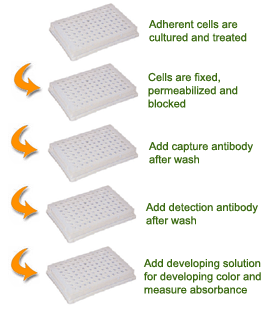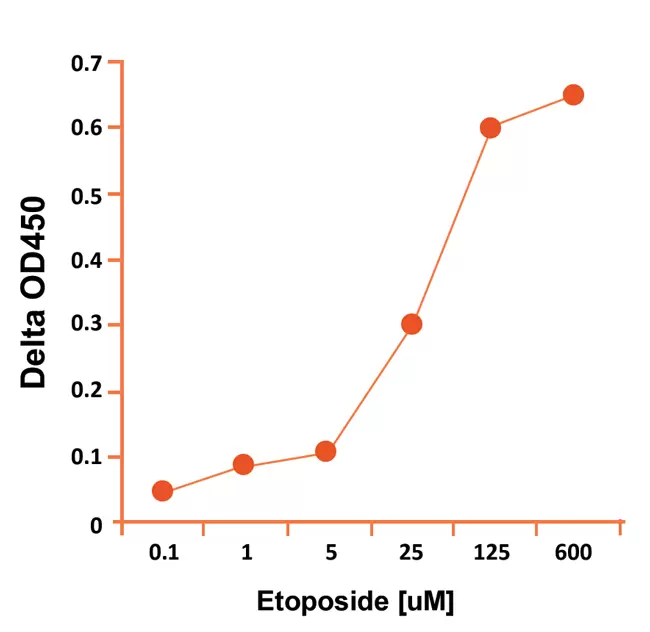EpiQuik In Situ DNA Damage Assay Kit
| Specifications | |
|---|---|
| Product Category: | Apoptosis Detection |
Product Description
The EpiQuik™ In Situ DNA Damage Assay Kit is a convenient set of tools that allows the experimenter to detect DNA damage or apoptosis by measuring phosphorylation of H2AXSer139 in situ. The kit is ready-to-use and provides all the essential components needed for specifically measuring DNA damage in situ through phospho H2AXSer139 detection using cultured adherent cells. The kit has the following advantages:
- Quick and efficient procedure, which can be finished within 3 hours
- Innovative colorimetric assay without the need for radioactivity, electrophoresis, and chromatography
- Measurement of in situ histone H2AX phosphorylation without the need to prepare cell lysates
- Microplate format makes the assay suitable for high throughput analysis of agents that increases or inhibits DNA damage
- Simple, reliable, and consistent assay conditions
Principle & Procedure
EpiQuik™ In Situ DNA Damage Assay Kit is a whole cell-based detection of DNA damage and/or apoptosis. In this assay, adherent cells are cultured in conventional 96 -well microplates. After your experimental treatment, cells are fixed and permeabilized. The phosphorylation of H2AX at serine139, the sensitive marker of DNA damage, is then detected by an anti-phospho H2AXSer139 antibody. The ratio or amount of phospho H2AXSer139 can be quantified through HRP conjugated secondary antibody-color development system and is proportional to the intensity of color development.

Performance Data

Fig.1. MCF-7 cells in microplate wells were exposed to etoposide for 4 h and DNA damage was detected by the measuring level of phosphor-H2AX.
Product Citations
- Lodhi N, Nagpal P, Sarojini S, Keck M, Chiu YM, Parvez Z, Adrianzen L, Suh KS (2022) Synergetic effect of high dose rate radiations (10× FFF/2400 MU/min/10 MV x-rays) and paclitaxel selectively eliminates melanoma cells. Cancer Rep (Hoboken)
- Taj M.B., Ali O.M. (2022) Exploring novel fluorine rich fuberidazole derivatives as hypoxic cancer inhibitors: design, synthesis, pharmacokinetics, molecular docking and DFT evaluations bioRxiv
- Zhang Y et al. (2019) N-Acetyl Cysteine as a Novel Polymethyl Methacrylate Resin Component: Protection against Cell Apoptosis and Genotoxicity Oxidative Medicine and Cellular Longevity
- Festuccia C et al. (2018) The first-in-class alkylating deacetylase inhibitor molecule tinostamustine shows antitumor effects and is synergistic with radiotherapy in preclinical models of glioblastoma. J Hematol Oncol 11(1):32
- Gravina GL et al. (2017) The novel CXCR4 antagonist, PRX177561, reduces tumor cell proliferation and accelerates cancer stem cell differentiation in glioblastoma preclinical models. Tumour Biol 39(6):1010430000000000
- Catalog Number
P-6001-096-EP - Supplier
EpigenTek - Size
- Shipping
Blue Ice

